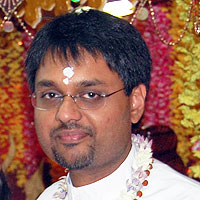From a satsang with Pt. Dr. Umesh Persad, Spiritual Leader, SWAHA Gyaan Deepak Kirtan Mandali
In the period of Pitra Paksha, we offer our gratitude to our ancestors for their contribution to our lives. However, how do we practise gratitude on a daily basis? Gratitude is both a way of thinking and being. Every moment in life, we have a choice to make about how we are going to think about the world. We might get frustrated and dejected, and think about all the things we do not possess, but then we will mentally suffer in our mind. The other choice is to adopt an attitude of gratitude where we focus on all that we do have. Instead of looking at what is depressing, we need to look at what is a blessing. We must stop focusing on how stressed we are and focus on how blessed we are. Adopt the attitude of gratitude and we will turn around our life. We must also develop that gratitude as a habit. As human beings our habits are based on how we train our minds to think and what we train ourselves to do.
What is the benefit of gratitude? It has been shown that it leads to peace of mind, lower blood pressure, better sleep, reduced stress, better response from the immune system. Gratitude is an essential concept in Sanaatan Dharma. We are taught that all humans must repay the five debts of gratitude: Dev yagya, gratitude to God and the universe for all these resources we have on this earth; Rishi yagya, gratitude to the sages and seers for the knowledge they have imparted to us about the meaning of life and how we should live; Pitri yagya, gratitude to those who have gone before us since the objects around us, and even our own bodies, were created by those who went before us; Manush yagya, to our family and society who support us; and Bhoot yagya, which we consider the lower forms of creation, but which are in fact interdependent as a part of nature.
How do we practise gratitude? By thinking in a grateful way. We should be grateful for both the things that we have as well as the relationships in our life. When we wake up in the morning, the first thing we should do is say a prayer, but also focus on two or three things for which we are grateful. We should count our blessings on a daily basis. We might be grateful for our parents or family, for having a place to live and something to eat.
Having thought about the things which make us grateful, how do we express gratitude? It is said that feeling gratitude and not expressing it is like wrapping up a present but not giving it to anybody. How should we express gratitude to others? First, we should describe the situation we are grateful for. Then we should talk about the behaviour and the good quality they exhibited. Thirdly, how did this impact us and make us feel? Even Shree Raam, the Supreme Being manifested on earth, expressed gratitude to His devout devotee, Shree Hanuman, the embodiment of competence and humility, an action which we can all emulate. As we become more spiritual, these positive qualities such as gratitude develop within us.




Errol Johnson
Very good katha